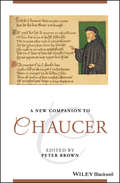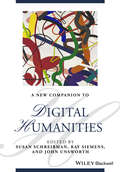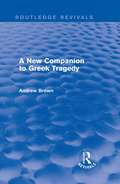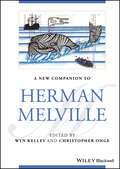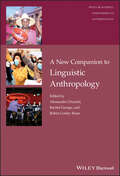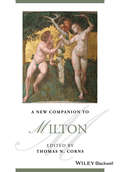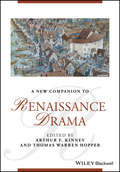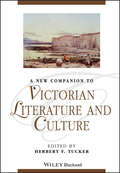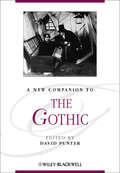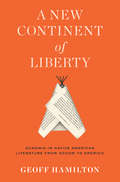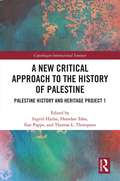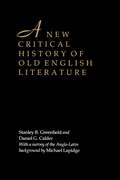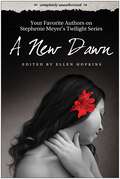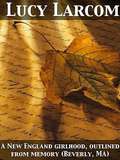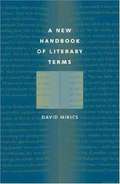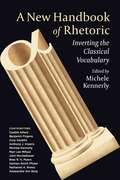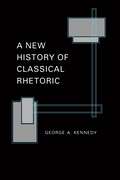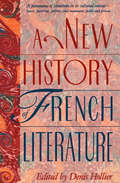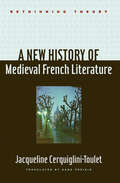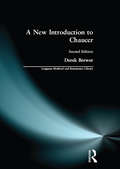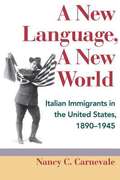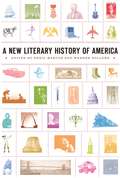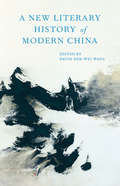- Table View
- List View
A New Companion to Chaucer (Blackwell Companions to Literature and Culture)
by Peter BrownThe extensively revised and expanded version of the acclaimed Companion to Chaucer An essential text for both established scholars and those seeking to expand their knowledge of Chaucer studies, A New Companion to Chaucer is an authoritative and up-to-date survey of Chaucer scholarship. Rigorous yet accessible, this book helps readers to identify current debates, recognize historical and literary context, and to understand how particular concepts and theories affect the interpretation of Chaucer’s texts. Chaucer specialists from around the globe offer contributions that range from updates of long-standing scholarship on biography, language, women, and social structures, to original research in new areas such as ideology, the afterlife, patronage, and sexuality. In presenting conflicting perspectives and ideological differences, this stimulating volume encourages readers to explore additional paths of inquiry and engage in lively and informed debate. Each chapter of the Companion, organized by issues and themes, balances textual analysis and cultural context by grounding the reader in existing scholarship. Key issues from specific passages are discussed with an annotated bibliography provided for reference and further reading. Compiled with all students of Chaucer in mind, this important volume: Presents contributions from both established and emerging specialists Explores the circumstances in which Chaucer wrote, such as the political and religious issues of his time Includes numerous close readings of selected poems Provides points of entry to a wide range of approaches to Chaucer’s works Incorporates original research, fresh perspectives, and updated additions to Chaucer scholarship A New Companion to Chaucer is a valuable and enduring resource for scholars, teachers, and students of medieval literature and medieval studies, as well as the general reader interested in interpretations and historical contexts of Chaucer’s writings.
A New Companion to Digital Humanities (Blackwell Companions to Literature and Culture)
by Susan Schreibman Ray Siemens John UnsworthThis highly-anticipated volume has been extensively revised to reflect changes in technology, digital humanities methods and practices, and institutional culture surrounding the valuation and publication of digital scholarship. A fully revised edition of a celebrated reference work, offering the most comprehensive and up-to-date collection of research currently available in this rapidly evolving discipline Includes new articles addressing topical and provocative issues and ideas such as retro computing, desktop fabrication, gender dynamics, and globalization Brings together a global team of authors who are pioneers of innovative research in the digital humanities Accessibly structured into five sections exploring infrastructures, creation, analysis, dissemination, and the future of digital humanities Surveys the past, present, and future of the field, offering essential research for anyone interested in better understanding the theory, methods, and application of the digital humanities
A New Companion to Greek Tragedy (Routledge Revivals)
by Andrew BrownThat the works of the ancient tragedians still have an immediate and profound appeal surely needs no demonstration, yet the modern reader continually stumbles across concepts which are difficult to interpret or relate to – moral pollution, the authority of oracles, classical ideas of geography – as well as the names of unfamiliar legendary and mythological figures. A New Companion to Greek Tragedy provides a useful reference tool for the ‘Greekless’ reader: arranged on a strictly encyclopaedic pattern, with headings for all proper names occurring in the twelve most frequently read tragedies, it contains brief but adequately detailed essays on moral, religious and philosophical terms, as well as mythical genealogies where important. There are in addition entries on Greek theatre, technical terms and on other writers from Aristotle to Freud, whilst the essay by P. E. Easterling traces some connections between the ideas found in the tragedians and earlier Greek thought.
A New Companion to Herman Melville (Blackwell Companions to Literature and Culture)
by Wyn Kelley Christopher OhgeDiscover a fascinating new set of perspectives on the life and work of Herman Melville A New Companion to Herman Melville delivers an insightful examination of Melville for the twenty-first century. Building on the success of the first Blackwell Companion to Herman Melville, and offering a variety of tools for reading, writing, and teaching Melville and other authors, this New Companion offers critical, technological, and aesthetic practices that can be employed to read Melville in exciting and revelatory ways. Editors Wyn Kelley and Christopher Ohge create a framework that reflects a pluralistic model for humanities teaching and research. In doing so, the contributing authors highlight the ways in which Melville himself was concerned with the utility of tools within fluid circuits of meaning, and how those ideas are embodied, enacted, and mediated. In addition to considering critical theories of race, gender, sexuality, religion, transatlantic and hemispheric studies, digital humanities, book history, neurodiversity, and new biography and reception studies, this book offers: A thorough introduction to the life of Melville, as well as the twentieth- and twenty-first-century revivals of his work Comprehensive explorations of Melville&’s works, including Moby-Dick, Pierre, Piazza Tales, and Israel Potter, as well as his poems and poetic masterpiece Clarel Practical discussions of material books, print culture, and digital technologies as applied to Melville In-depth examinations of Melville's treatment of the natural world Two symposium sections with concise reflections on art and adaptation, and on teaching and public engagement A New Companion to Herman Melville provides essential reading for scholars and students ranging from undergraduate and graduate students to more advanced scholars and specialists in the field.
A New Companion to Linguistic Anthropology (Wiley Blackwell Companions to Anthropology)
by Alessandro Duranti Robin Conley Riner Rachel GeorgeProvides an expansive view of the full field of linguistic anthropology, featuring an all-new team of contributing authors representing diverse new perspectives A New Companion to Linguistic Anthropology provides a timely and authoritative overview of the field of study that explores how language influences society and culture. Bringing together more than 30 original essays by an interdisciplinary panel of renowned scholars and younger researchers, this comprehensive volume covers a uniquely wide range of both classic and contemporary topics as well as cutting-edge research methods and emerging areas of investigation. Building upon the success of its predecessor, the acclaimed Blackwell Companion to Linguistic Anthropology, this new edition reflects current trends and developments in research and theory. Entirely new chapters discuss topics such as the relationship between language and experiential phenomena, the use of research data to address social justice, racist language and raciolinguistics, postcolonial discourse, and the challenges and opportunities presented by social media, migration, and global neoliberalism. Innovative new research analyzes racialized language in World of Warcraft, the ethics of public health discourse in South Africa, the construction of religious doubt among Orthodox Jewish bloggers, hybrid forms of sociality in videoconferencing, and more. Presents fresh discussions of topics such as American Indian speech communities, creolization, language mixing, language socialization, deaf communities, endangered languages, and language of the law Addresses recent trends in linguistic anthropological research, including visual documentation, ancient scribes, secrecy, language and racialization, global hip hop, justice and health, and language and experience Utilizes ethnographic illustration to explore topics in the field of linguistic anthropology Includes a new introduction written by the editors and an up-to-date bibliography with over 2,000 entries A New Companion to Linguistic Anthropology is a must-have for researchers, scholars, and undergraduate and graduate students in linguistic anthropology, as well as an excellent text for those in related fields such as sociolinguistics, discourse studies, semiotics, sociology of language, communication studies, and language education.
A New Companion to Milton (Blackwell Companions to Literature and Culture)
by Thomas N. CornsA New Companion to Milton builds on the critically-acclaimed original, bringing alive the diverse and controversial world of contemporary Milton studies while reflecting the very latest advances in research in the field. Comprises 36 powerful readings of Milton's texts and the contexts in which they were created, each written by a leading scholar Retains 28 of the award-winning essays from the first edition, revised and updated to reflect the most recent research Contains a new section exploring Milton's global impact, in China, India, Japan, Korea, in Spanish speaking American and the Arab-speaking world Includes eight completely new full-length essays, each of which engages closely with Milton's poetic oeuvre, and a new chronology which sets Milton's life and work in the context of his age Explores literary production and cultural ideologies, issues of politics, gender and religion, individual Milton texts, and responses to Milton over time
A New Companion to Renaissance Drama (Blackwell Companions to Literature and Culture)
by Arthur F. Kinney Thomas Warren HopperA New Companion to Renaissance Drama provides an invaluable summary of past and present scholarship surrounding the most popular and influential literary form of its time. Original interpretations from leading scholars set the scene for important paths of future inquiry. A colorful, comprehensive and interdisciplinary overview of the material conditions of Renaissance plays, England's most important dramatic period Contributors are both established and emerging scholars, with many leading international figures in the discipline Offers a unique approach by organizing the chapters by cultural context, theatre history, genre studies, theoretical applications, and material studies Chapters address newest departures and future directions for Renaissance drama scholarship Arthur Kinney is a world-renowned figure in the field
A New Companion to Victorian Literature and Culture (Blackwell Companions to Literature and Culture)
by Herbert F. TuckerThe Victorian period was a time of rapid cultural change, which resulted in a huge and varied literary output. A New Companion to Victorian Literature and Culture offers experienced guidance to the literature of nineteenth-century Britain and its social and historical context. This revised and expanded edition comprises contributions from over 30 leading scholars who, approaching the Victorian epoch from different positions and traditions, delve into the unruly complexities of the Victorian imagination. Divided into five parts, this new companion surveys seven decades of history before examining the keys phases in a Victorian life, the leading professions and walks of life, the major Victorian literary genres, and the way Victorians defined their persons, their homes, and their national identities. Important topics such as sexuality, denominational faith, social class, and global empire inform each chapter’s approach. Each chapter provides a comprehensive bibliography of established and emerging scholarship.
A New Companion to the Gothic
by David PunterThe thoroughly expanded and updated New Companion to the Gothic, provides a series of stimulating insights into Gothic writing, its history and genealogy. The addition of 12 new essays and a section on 'Global Gothic' reflects the direction Gothic criticism has taken over the last decade.Many of the original essays have been revised to reflect current debatesOffers comprehensive coverage of criticism of the Gothic and of the various theoretical approaches it has inspired and spawnedFeatures important and original essays by leading scholars in the fieldThe editor is widely recognized as the founder of modern criticism of the Gothic
A New Continent of Liberty: Eunomia in Native American Literature from Occom to Erdrich
by Geoff HamiltonBeginning with the writings of Samson Occom, and extending through a range of fiction and nonfiction works by William Apess, Sarah Winnemucca, Zitkala-Ša, N. Scott Momaday, Gerald Vizenor, and Louise Erdrich, Geoff Hamilton sketches a movement of gradual but resolute ascent in Native American literature. The history of this rich tradition of storytellers begins with desperate early efforts pitted against the historical realities of genocide and cultural annihilation. It moves to attempts to preserve any sense of self and community, and finally toward expressions of a resurgent autonomy that affirm new, indigenous models of what Hamilton labels as eunomia, a fertile blending of human and natural orders.The first book to chart autonomy’s conceptual growth in Native American literature from the late eighteenth to the early twenty-first century, A New Continent of Liberty examines, against the backdrop of Euro-American Literature, how Native American authors have sought to reclaim and redefine distinctive versions of an ideal of self-rule grounded in the natural world.
A New Critical Approach to the History of Palestine: Palestine History and Heritage Project 1
by Ilan Pappe Thomas L. Thompson Ingrid Hjelm Hamdan TahaA New Critical Approach to the History of Palestine discusses prospects and methods for a comprehensive, evidence-based history of Palestine with a critical use of recent historical, archaeological and anthropological methods. This history is not an exclusive history but one that is ethnically and culturally inclusive, a history of and for all peoples who have lived in Palestine. After an introductory essay offering a strategy for creating coherence and continuity from the earliest beginnings to the present, the volume presents twenty articles from twenty-two contributors, fifteen of whom are of Middle Eastern origin or relation. Split thematically into four parts, the volume discusses ideology, national identity and chronology in various historiographies of Palestine, and the legacy of memory and oral history; the transient character of ethnicity in Palestine and questions regarding the ethical responsibilities of archaeologists and historians to protect the multi-ethnic cultural heritage of Palestine; landscape and memory, and the values of community archaeology and bio-archaeology; and an exploration of the “ideology of the land” and its influence on Palestine’s history and heritage. The first in a series of books under the auspices of the Palestine History and Heritage Project (PaHH), the volume offers a challenging new departure for writing the history of Palestine and Israel throughout the ages. A New Critical Approach to the History of Palestine explores the diverse history of the region against the backdrop of twentieth-century scholarly construction of the history of Palestine as a history of a Jewish homeland with roots in an ancient, biblical Israel and examines the implications of this ancient and recent history for archaeology and cultural heritage. The book offers a fascinating new perspective for students and academics in the fields of anthropological, political, cultural and biblical history.
A New Critical History of Old English Literature
by Stanley B. Greenfield Daniel G. CalderAnglo-Saxon prose and poetry is, without question, the major literary achievement of the early Middle Ages (c. 700-1100). In no other vernacular language does such a vast store of verbal treasures exist for so extended a period of time. For twenty years the definitive guide to that literature has been Stanley B. Greenfield's 1965 Critical History of Old English Literature. Now this classic has been extensively revised and updated to make it more valuable than ever to both the student and scholar.
A New Dawn: Your Favorite Authors on Stephenie Meyer's Twilight Series: Completely Unauthorized
by Ellen HopkinsFans of the literary phenomenon known as the Twilight series can't help wanting more. A New Dawn gives it to them, inviting readers to join some of their favorite YA authors as they look at the series with fresh eyes and fall in love with Edward, Bella, and the rest of Forks, Wash., all over again. Edited by bestselling author Ellen Hopkins, A New Dawn is packed with the same debates readers engage in with friends: Should Bella have chosen Edward or Jacob? How much control do Meyer's vampires and werewolves really have over their own lives? The collection also goes further: Is Edward a romantic or a (really hot) sociopath? How do the Quileute werewolves compare to other Native American wolf myths? What does the Twilight series have in common with Shakespeare? With contributions from Megan McCafferty, Cassandra Clare, Rachel Caine, and many more, A New Dawn answers these questions and more for a teen (and adult!) audience hungry for clever, view-changing commentary on their favorite series.
A New England Girlhood, Outlined from Memory (Beverly, MA)
by Lucy LarcomArriving in Lowell, Massachusetts, in the 1830s after the death of her shipmaster father, the eleven-year-old Lucy Larcom went to work in a textile mill to help her family make ends meet. <P> <P> Originally published in 1889, her autobiography offers glimpses of the early years of the American factory system as well as of the social influences on her development. It remains an important and illuminating document of the Industrial Revolution and nineteenth-century cultural history.
A New Handbook of Literary Terms
by David MikicsA New Handbook of Literary Terms offers a lively, informative guide to words and concepts that every student of literature needs to know. Mikics's definitions are essayistic, witty, learned, and always a pleasure to read. They sketch the derivation and history of each term, including especially lucid explanations of verse forms and providing a firm sense of literary periods and movements from classicism to postmodernism. The Handbook also supplies a helpful map to the intricate and at times confusing terrain of literary theory at the beginning of the twenty-first century: the author has designated a series of terms, from New Criticism to queer theory, that serves as a concise but thorough introduction to recent developments in literary study. Mikics's Handbook is ideal for classroom use at all levels, from freshman to graduate. Instructors can assign individual entries, many of which are well-shaped essays in their own right. Useful bibliographical suggestions are given at the end of most entries. The Handbook's enjoyable style and thoughtful perspective will encourage students to browse and learn more. Every reader of literature will want to own this compact, delightfully written guide.
A New Handbook of Rhetoric: Inverting the Classical Vocabulary
by Michele KennerlyLike every discipline, Rhetorical Studies relies on a technical vocabulary to convey specialized concepts, but few disciplines rely so deeply on a set of terms developed so long ago. Pathos, kairos, doxa, topos—these and others originate from the so-called classical world, which has conferred on them excessive authority. Without jettisoning these rhetorical terms altogether, this handbook addresses critiques of their ongoing relevance, explanatory power, and exclusionary effects.A New Handbook of Rhetoric inverts the terms of classical rhetoric by applying to them the alpha privative, a prefix that expresses absence. Adding the prefix α- to more than a dozen of the most important terms in the field, the contributors to this volume build a new vocabulary for rhetorical inquiry. Essays on apathy, akairos, adoxa, and atopos, among others, explore long-standing disciplinary habits, reveal the denials and privileges inherent in traditional rhetorical inquiry, and theorize new problems and methods. Using this vocabulary in an analysis of current politics, media, and technology, the essays illuminate aspects of contemporary culture that traditional rhetorical theory often overlooks.Innovative and groundbreaking, A New Handbook of Rhetoric at once draws on and unsettles ancient Greek rhetorical terms, opening new avenues for studying values, norms, and phenomena often stymied by the tradition.In addition to the editor, the contributors include Caddie Alford, Benjamin Firgens, Cory Geraths, Anthony J. Irizarry, Mari Lee Mifsud, John Muckelbauer, Bess R. H. Myers, Damien Smith Pfister, Nathaniel A. Rivers, and Alessandra Von Burg.
A New Handbook of Rhetoric: Inverting the Classical Vocabulary
by Michele KennerlyLike every discipline, Rhetorical Studies relies on a technical vocabulary to convey specialized concepts, but few disciplines rely so deeply on a set of terms developed so long ago. Pathos, kairos, doxa, topos—these and others originate from the so-called classical world, which has conferred on them excessive authority. Without jettisoning these rhetorical terms altogether, this handbook addresses critiques of their ongoing relevance, explanatory power, and exclusionary effects.A New Handbook of Rhetoric inverts the terms of classical rhetoric by applying to them the alpha privative, a prefix that expresses absence. Adding the prefix α- to more than a dozen of the most important terms in the field, the contributors to this volume build a new vocabulary for rhetorical inquiry. Essays on apathy, akairos, adoxa, and atopos, among others, explore long-standing disciplinary habits, reveal the denials and privileges inherent in traditional rhetorical inquiry, and theorize new problems and methods. Using this vocabulary in an analysis of current politics, media, and technology, the essays illuminate aspects of contemporary culture that traditional rhetorical theory often overlooks.Innovative and groundbreaking, A New Handbook of Rhetoric at once draws on and unsettles ancient Greek rhetorical terms, opening new avenues for studying values, norms, and phenomena often stymied by the tradition.In addition to the editor, the contributors include Caddie Alford, Benjamin Firgens, Cory Geraths, Anthony J. Irizarry, Mari Lee Mifsud, John Muckelbauer, Bess R. H. Myers, Damien Smith Pfister, Nathaniel A. Rivers, and Alessandra Von Burg.
A New History of Classical Rhetoric
by George A. KennedyGeorge Kennedy's three volumes on classical rhetoric have long been regarded as authoritative treatments of the subject. This new volume, an extensive revision and abridgment of The Art of Persuasion in Greece, The Art of Rhetoric in the Roman World, and Greek Rhetoric under Christian Emperors, provides a comprehensive history of classical rhetoric, one that is sure to become a standard for its time. Kennedy begins by identifying the rhetorical features of early Greek literature that anticipated the formulation of "metarhetoric," or a theory of rhetoric, in the fifth and fourth centuries b.c.e. and then traces the development of that theory through the Greco-Roman period. He gives an account of the teaching of literary and oral composition in schools, and of Greek and Latin oratory as the primary rhetorical genre. He also discusses the overlapping disciplines of ancient philosophy and religion and their interaction with rhetoric. The result is a broad and engaging history of classical rhetoric that will prove especially useful for students and for others who want an overview of classical rhetoric in condensed form.
A New History of French Literature
by Barbara Johnson R. Howard Bloch Peter Brooks Nancy K. Miller Joan DeJean Nancy J. Vickers Denis Hollier Philip E. Lewis François RigolotDesigned for the general reader, this splendid introduction to French literature from 842 A.D.—the date of the earliest surviving document in any Romance language—to the present decade is the most compact and imaginative single-volume guide available in English to the French literary tradition. In fact, no comparable work exists in either language. It is not the customary inventory of authors and titles but rather a collection of wide-angled views of historical and cultural phenomena. It sets before us writers, public figures, criminals, saints, and monarchs, as well as religious, cultural, and social revolutions. It gives us books, paintings, public monuments, even TV shows. Written by 164 American and European specialists, the essays are introduced by date and arranged in chronological order, but here ends the book’s resemblance to the usual history of literature. Each date is followed by a headline evoking an event that indicates the chronological point of departure. Usually the event is literary—the publication of an original work, a journal, a translation, the first performance of a play, the death of an author—but some events are literary only in terms of their repercussions and resonances. Essays devoted to a genre exist alongside essays devoted to one book, institutions are presented side by side with literary movements, and large surveys appear next to detailed discussions of specific landmarks. No article is limited to the “life and works” of a single author. Proust, for example, appears through various lenses: fleetingly, in 1701, apropos of Antoine Galland’s translation of The Thousand and One Nights; in 1898, in connection with the Dreyfus Affair; in 1905, on the occasion of the law on the separation of church and state; in 1911, in relation to Gide and their different treatments of homosexuality; and at his death in 1922. Without attempting to cover every author, work, and cultural development since the Serments de Strasbourg in 842, this history succeeds in being both informative and critical about the more than 1,000 years it describes. The contributors offer us a chance to appreciate not only French culture but also the major critical positions in literary studies today. A New History of French Literature will be essential reading for all engaged in the study of French culture and for all who are interested in it. It is an authoritative, lively, and readable volume.
A New History of Medieval French Literature (Rethinking Theory)
by Jacqueline Cerquiglini-TouletIs it legitimate to conceive of and write a history of medieval French literature when the term "literature" as we know it today did not appear until the very end of the Middle Ages? In this novel introduction to French literature of the period, Jacqueline Cerquiglini-Toulet says yes, arguing that a profound literary consciousness did exist at the time.Cerquiglini-Toulet challenges the standard ways of reading and evaluating literature, considering medieval literature not as separate from that in other eras but as part of the broader tradition of world literature. Her vast and learned readings of both canonical and lesser-known works pose crucial questions about, among other things, the notion of otherness, the meaning of change and stability, and the relationship of medieval literature with theology. Part history of literature, part theoretical criticism, this book reshapes the language and content of medieval works. By weaving together topics such as the origin of epic and lyric poetry, Latin-French bilingualism, women’s writing, grammar, authorship, and more, Cerquiglini-Toulet does nothing less than redefine both philosophical and literary approaches to medieval French literature. Her book is a history of the literary act, a history of words, a history of ideas and works—monuments rather than documents—that calls into question modern concepts of literature.
A New Introduction to Chaucer (Longman Medieval and Renaissance Library)
by D. S. BrewerThis new introduction to Chaucer has been radically rewritten since the previous edition which was published in 1984. The book is a controversial and modern restatement of some of the traditional views on Chaucer, and seeks to present a rounded introduction to his life, cultural setting and works. Professor Brewer takes into account recent literary criticism, both challenging new ideas and using them in his analysis of Chaucer's work. Above all, there is a strong emphasis on leading the reader to understand and enjoy the poetry and prose, and to try to understand Chaucer's values which are often seen to oppose modern principles. A New Introduction to Chaucer is the result of Derek Brewer's distinguished career spanning fifty years of research and study of Chaucer and contemporary scholarship and criticism. New interpretations of many of the poems are presented including a detailed account of the Book of the Duchess. Derek Brewer's fresh and narrative style of writing will appeal to all who are interested in Chaucer, from sixth-form and undergraduate students who are new to Chaucer's work through to more advanced students and lecturers.
A New Language, A New World: Italian Immigrants in the United States, 1890-1945
by Nancy C. CarnevaleAn examination of Italian immigrants and their children in the early twentieth century, A New Language, A New World is the first full-length historical case study of one immigrant group's experience with language in America. Incorporating the interdisciplinary literature on language within a historical framework, Nancy C. Carnevale illustrates the complexity of the topic of language in American immigrant life. By looking at language from the perspectives of both immigrants and the dominant culture as well as their interaction, this book reveals the role of language in the formation of ethnic identity and the often coercive context within which immigrants must negotiate this process.
A New Literary History of America (Harvard University Press Reference Library)
by Werner Sollors Greil MarcusAmerica is a nation making itself up as it goes along—a story of discovery and invention unfolding in speeches and images, letters and poetry, unprecedented feats of scholarship and imagination. In these myriad, multiform, endlessly changing expressions of the American experience, the authors and editors of this volume find a new American history.In more than two hundred original essays, A New Literary History of America brings together the nation’s many voices. From the first conception of a New World in the sixteenth century to the latest re-envisioning of that world in cartoons, television, science fiction, and hip hop, the book gives us a new, kaleidoscopic view of what “Made in America” means. Literature, music, film, art, history, science, philosophy, political rhetoric—cultural creations of every kind appear in relation to each other, and to the time and place that give them shape.The meeting of minds is extraordinary as T. J. Clark writes on Jackson Pollock, Paul Muldoon on Carl Sandburg, Camille Paglia on Tennessee Williams, Sarah Vowell on Grant Wood’s American Gothic, Walter Mosley on hard-boiled detective fiction, Jonathan Lethem on Thomas Edison, Gerald Early on Tarzan, Bharati Mukherjee on The Scarlet Letter, Gish Jen on Catcher in the Rye, and Ishmael Reed on Huckleberry Finn. From Anne Bradstreet and John Winthrop to Philip Roth and Toni Morrison, from Alexander Graham Bell and Stephen Foster to Alcoholics Anonymous, Life, Chuck Berry, Alfred Hitchcock, and Ronald Reagan, this is America singing, celebrating itself, and becoming something altogether different, plural, singular, new.
A New Literary History of Modern China
by Edited by David Der-wei WangFeaturing over 140 Chinese and non-Chinese contributors, this landmark volume, edited by David Der-wei Wang, explores unconventional forms as well as traditional genres, emphasizes Chinese authors’ influence on foreign writers as well as China’s receptivity to outside literary influences, and offers vibrant contrasting voices and points of view.
